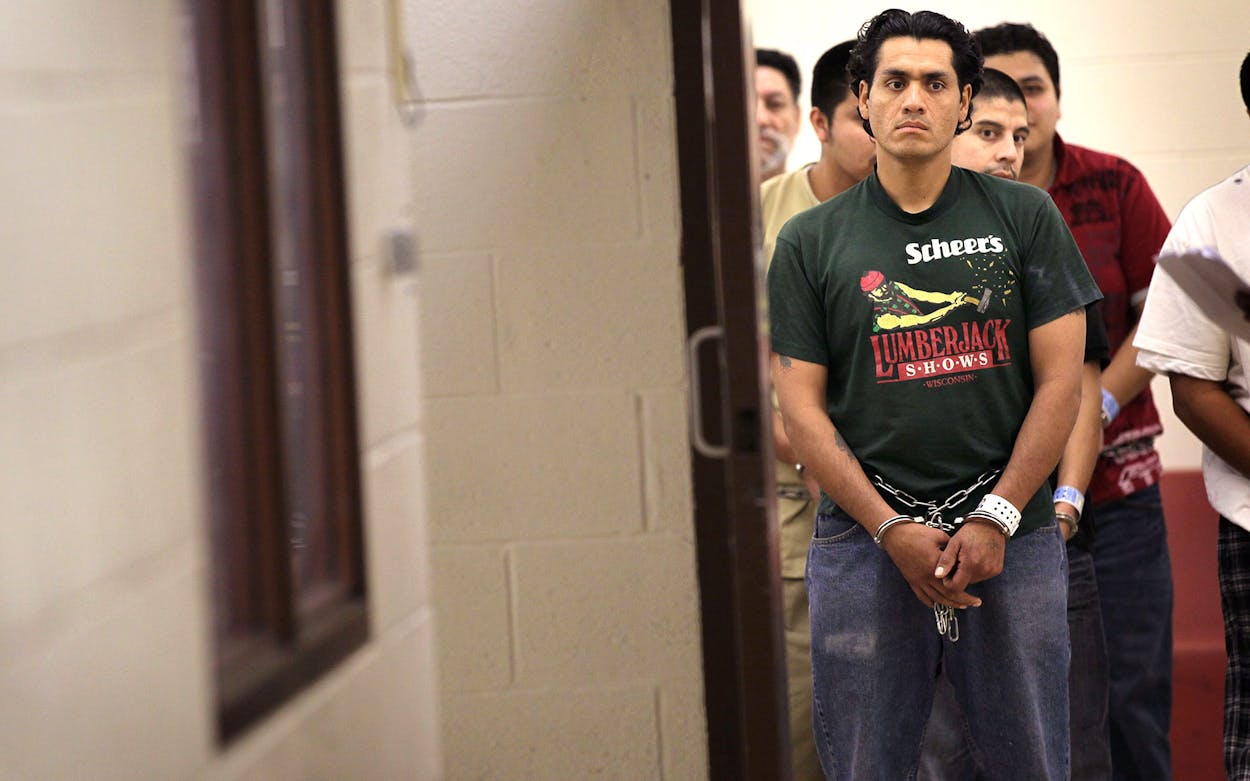Earlier this week, the U.S. Fifth Circuit Court of Appeals heard arguments in Senate Bill 4, the law Texas passed earlier this year to ban cities like Austin and San Antonio from behaving as “sanctuary cities.” The law was controversial during the legislative session: protesters turned up at the Capitol and state offices, and several, including Austin city council-member Greg Casar, chose to get arrested rather than disperse. At one point, Republican Representative Matt Rinaldi called ICE to deport on demonstrators in the Capitol, and was accused of threatening to shoot a colleague. The bill’s provisions continue to raise questions as it makes its way through the legal system.
For the most part, the ways that cities resist federal immigration rules resemble the sanctuary city practices: they create policies, either formal or informal, that read as non-compliance. They refuse to exchange immigration information obtained during arrests with federal agencies, or fail to cooperate with detainer requests. And at both the federal and state level, there’s been pushback against such policies. SB 4, which created penalties including large fines and jail time for officials who don’t comply with federal policy, was one example of the reaction to so-called sanctuary cities. The increased immigration crackdown in cities like Austin over the spring and summer may have been as well.
But non-compliance isn’t the only tool for cities to support their residents who face deportation, whether they’re undocumented or accused of crimes that could cost them their legal immigration status. On Thursday, eleven U.S. cities, including Austin and San Antonio, announced a proactive plan to stop deportations. The SAFE Cities Network, which launched with the Vera Institute for Justice, vows to provide a publicly-funded attorney to every person in each city who faces deportation:
SAFE Cities Network jurisdictions will offer an expanding model for encouraging both safe and welcoming communities. Each jurisdiction was selected by Vera through a competitive request for proposals process. All selected jurisdictions demonstrated their commitment to deportation defense by investing public dollars, which were matched by a catalyst fund administered by Vera.
“Immigration is part of our nation’s past, present, and future, and our communities will find more opportunities to grow and thrive when we recognize and embrace this fact. That means that all residents must see their justice systems—from our law enforcement to our courts—as delivering on our country’s promise of fairness,” said Nicholas Turner, president of the Vera Institute of Justice. “Common sense immigration policies like those embodied by the SAFE Cities Network ensure that all people, regardless of background, income, and history, are guaranteed a fair day in court. Not only does such public funding for indigent immigrants facing deportation maintain trust within our communities, it ultimately increases public safety and keeps deserving families together.”
Everyone who faces criminal charges in America is entitled to a lawyer, regardless of immigration status. But immigration detainees don’t face criminal charges, so their cases don’t move through the judiciary. Rather, those cases go through the executive branch and the Department of Justice. As a result, only 37% of immigrants facing deportation have legal representation as they go through a process with consequences as dramatic and serious as a criminal conviction.
Having a lawyer makes a big difference in immigration procedures. A study from Vera, using data from a similar program piloted at New York’s Varick Street Immigration Court and funded by the city since 2014, suggests that the number of deportations go down dramatically when everyone in the process has a lawyer. Without lawyers, the study found that only 4% of detainees successfully managed to avoid deportation; with lawyers, that number spiked to 48% of cases ending in successful outcomes.
The SAFE Cities Network is funded by both the cities participating and through grants from Vera, and offers a layer of protection for immigrants in cities whose “sanctuary” status is increasingly at risk. Laws that target sanctuary cities, like SB 4, argue that elected officials and law enforcement behave lawlessly by refusing to cooperate with federal guidelines. “Elected officials and law enforcement agencies, they don’t get to pick and choose which laws they will obey,” said Governor Greg Abbott while advocating for SB 4. Offering representation to everyone who finds themselves in immigration court sidesteps the issue, offering cities a new avenue to express community values around immigration without directly confronting the state and federal governments above them.
That’s important for Austin and San Antonio, as the battle over local control grows increasingly pronounced in Texas. Laws preventing cities from determining their own fate—around immigration policy, as well as ridehailing apps and heritage trees—have been increasingly popular in Texas in recent sessions. But attempting to overturn a policy to provide legal aid, like that espoused by the SAFE Cities Network, at the state level would present a far greater challenge.
The two cities are the first in Texas to participate in a program like this, but not necessarily the last. Vera promises an “expanding model” for the SAFE Cities Network, and the eleven jurisdictions in the initial lineup range from the large-scale, like San Antonio and Chicago, to smaller cities like Madison, Wisconsin and Santa Ana, California.








